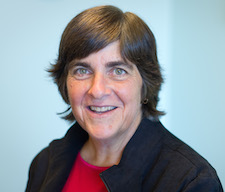Stanford MOOC pioneer takes a year off to teach for free around the world
Stanford computer science Professor Jennifer Widom was overwhelmed and humbled at the response to her massive open online course (MOOC) on databases in 2011.
Widom’s MOOC has generated 8 million video views and 600,000 student assignments. It’s still available as a series of free, self-paced minicourses on Stanford Online.

This year, during her sabbatical from Stanford, Widom is taking the MOOC concept one step further.
She’s teaching short courses for free around the world, mostly at under-resourced schools and universities. Course offerings include Big Data, Design Thinking and Problem Solving, and informal roundtables on Women and Technology.
“I knew I wanted to have a similar direct impact on lots of people,” Widom explained on her blog.
She got the idea on a trip to southern India, where she gave a talk on computer-science basics to a large group that included many people who’d taken part in her Databases MOOC.
“I realized how valuable and inspiring an in-person rather than online experience can be — both for them and for me .”
— Jennifer Widom, computer science professor
She quipped, “I like to say I’m pioneering the Massive Open In-Person Course, or MOIC.”
So far, she’s been booked into schools and institutes in 16 countries, ranging from the Hanoi University of Science and Technology in Vietnam to the University of Ibadan in Nigeria.
Her main conditions are that the schools lack experienced instructors in her areas of expertise, that the students know enough English to benefit from instruction and that the schools not charge them for attending her sessions.
Cultural exchanges and illuminations have abounded.
In Bhutan, a tiny kingdom that got the Internet only in 1999, Widom found slow connectivity and outdated pedagogy, but also faculty and students thirsty for knowledge and hugely eager for modern teaching.
“Just as I’m hoping for in all of my stops, a large number of students learned at least a few new things, and a handful of highly engaged ones benefited greatly — perhaps changing the course of their education,” Widom wrote.
Widom’s stint in Thailand coincided with the death of that country’s king. She feared that her classes might be canceled. In the end, they went on, but Widom and many of her students wore black and white in traditional mourning.
Follow Widom’s instructional odyssey on Facebook, including links to her blog posts along her journey.
Check out other course offerings on Stanford Online.



